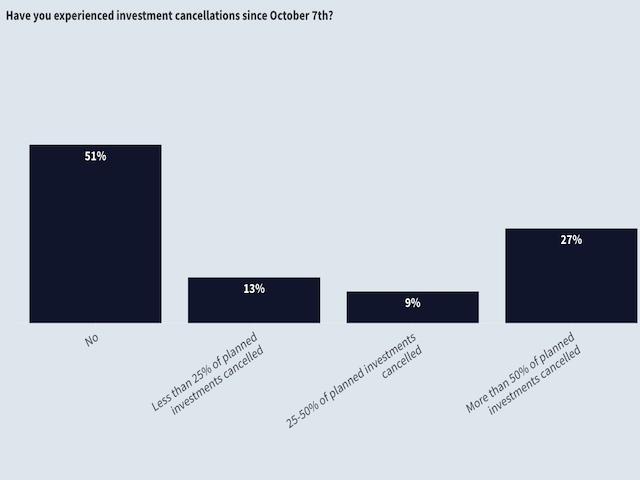As Israel continues to face unprecedented challenges since the outbreak of war on October 7th, the nation's high-tech sector, long celebrated as a beacon of innovation and resilience, is now navigating uncharted waters. A recent report titled “One Year of Israeli Innovation in War,” published by Startup Nation Central (SNC), reveals that nearly half (49%) of Israeli high-tech companies have experienced canceled investments since the conflict began, highlighting the severe impact on the sector that has been a crucial driver of Israel's economy.
Investment Uncertainty Amidst Conflict
The ripple effects of the ongoing war in Gaza, coupled with the looming threat from Hezbollah in Lebanon, have cast a shadow over the confidence of Israel's tech industry. Only 31% of companies surveyed believe they will successfully raise funds in the coming year, and a staggering 48% predict a continued decline in investments through 2025. This lack of confidence is not only a reflection of the immediate economic turmoil but also of the broader uncertainty about Israel’s long-term stability.
Our latest report, “One Year of Israeli Innovation in War,” delivers an in-depth look at how Israel’s tech ecosystem has adapted and evolved following October 7th.
— Startup Nation Central (@sncentral_) September 12, 2024
Leveraging data from Startup Nation Finder, our cutting-edge business engagement platform, and insights from a… pic.twitter.com/HK735BJWiQ
Traditionally, Israel’s economy has shown remarkable resilience during periods of conflict, with the high-tech sector often serving as a robust pillar of growth. However, the current war, with its far-reaching geopolitical implications, has tested this resilience like never before. Global confidence in Israeli innovation remains intact, yet there is growing skepticism about the government’s ability to steer the nation through this crisis effectively. Over 80% of tech companies express pessimism about the government’s recovery efforts in war-affected regions, and nearly three-quarters of investors doubt the Netanyahu government’s capability to restore the local tech ecosystem to its former glory.
Regional Disparities: North and South Bear the Brunt
The SNC report highlights significant regional disparities in how tech companies are faring amidst the conflict. Northern and southern Israel have borne the brunt of the war's impact, with businesses in these regions feeling the squeeze more acutely than those in central Israel, including Tel Aviv, the nation's commercial heart. In northern Israel, 69% of tech companies are concerned about their ability to secure funding in 2025, and approximately 40% are contemplating relocating all or part of their operations due to the ever-present threat from Hezbollah.
A Resilient Yet Vulnerable Sector
Despite these challenges, the Israeli tech sector has shown a remarkable degree of resilience. Since October 7th, it has managed to raise $7.8 billion in investments—only a slight 4% decrease from the previous year. Mergers and acquisitions have also been robust, with deals totaling $9.6 billion, down from $10.6 billion in the prior year. This resilience is largely fueled by the strength of Israel’s cybersecurity sector and thriving scale-up companies, even as early-stage ventures face significant hurdles.
SNC: Half of startups had investments canceled due to war: Startup Nation Central's report on the impact of the war on Israel's tech sector found resilience alongside low confidence in the government's efforts to tackle the situation. https://t.co/zDlMpBRjaF Globes pic.twitter.com/xgwO4UU0ve
— Jewish Community (@JComm_NewsFeeds) September 12, 2024
Startup Nation Central’s CEO Avi Hasson underscores the importance of this resilience, stating, “Israeli tech has shown incredible resilience in the face of prolonged conflict and mounting challenges. But this resilience cannot be taken for granted. The lack of long-term planning—whether in budget policy, research infrastructure, or future growth drivers—creates uncertainty that could undermine our momentum. Now more than ever, the government must act responsibly to ensure the sector continues to thrive, attract investment, and secure the future of our economy.”
A Call for Strategic Government Action
The sentiment is echoed by Dror Bin, CEO of the Israel Innovation Authority, who emphasized the sector’s high dependency on foreign investments and the intensifying global competition. He noted that many other nations are heavily investing in their tech ecosystems, posing a growing threat to Israel’s leading position. “The Israeli government must double-down on their investments in Israeli tech,” Bin warned, stressing that strategic, long-term planning is critical for sustaining the sector’s growth.
Interesting new report by Startup Nation Central on the Israeli tech ecosystem at war, one year on.
— Eze Vidra (@ediggs) September 12, 2024
One interesting point is this survey answer from 230 companies and 49 VC investors on the level of confidence in the Israeli tech ecosystem's ability to deliver amidst… pic.twitter.com/jnOjY8hOmh
Earlier this year, optimism among multinational companies operating in Israel was still notable, with 60% expressing confidence in the Israeli tech sector despite the war. However, the current climate of uncertainty has cast a long shadow over the future, making it imperative for the government to take bold and decisive actions to maintain the momentum of one of the world’s most vibrant tech ecosystems.
As Israel navigates these turbulent times, the resilience of its high-tech sector remains a testament to the nation’s innovative spirit. Yet, without proactive and strategic support from the government, the future of Israeli innovation could be at risk—a risk the nation cannot afford as it battles not only on the frontlines but also in the global race for technological supremacy.


